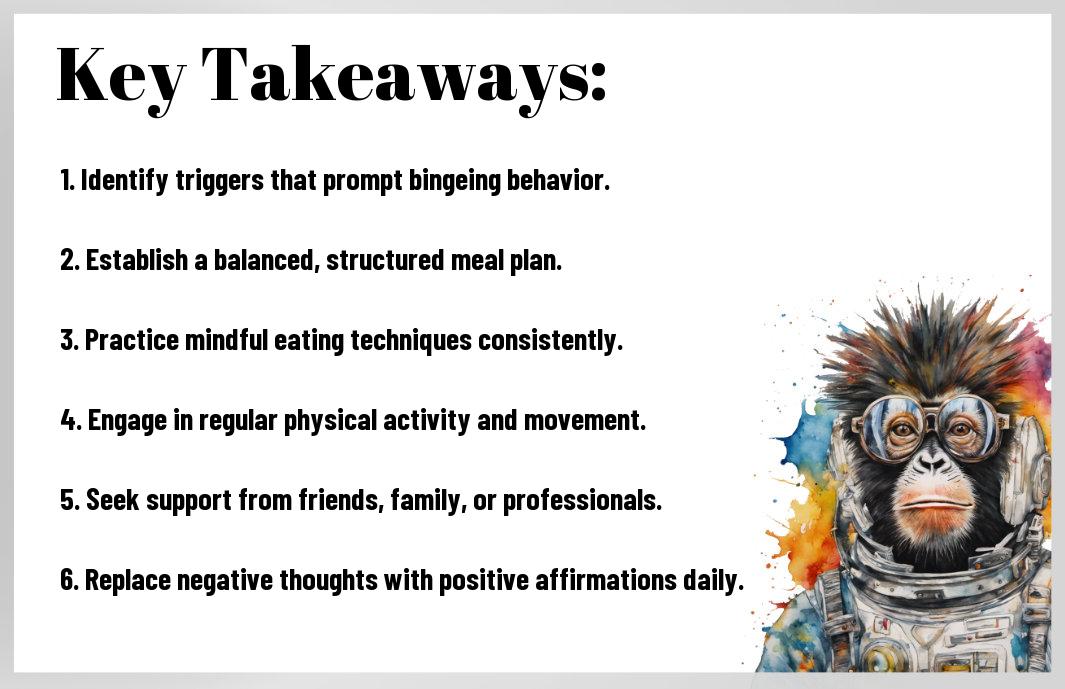Over time, I have come to realize that breaking the habits that lead to bingeing and compulsion requires both self-awareness and practical strategies. You may often find yourself caught in a cycle of unhealthy choices, but understanding the triggers and underlying emotions can empower you to make positive changes. In this post, I will share insights and actionable steps that can help you regain control over your behaviors and shift towards a healthier, more balanced lifestyle.
Key Takeaways:
- Identify triggers by keeping a journal to note situations, emotions, or environments that lead to bingeing or compulsive behaviors.
- Develop healthier coping mechanisms, such as mindfulness practices or alternative hobbies, to replace the urge to binge or engage in compulsive actions.
- Seek support from friends, family, or professional counseling to provide accountability and guidance in overcoming these habits.
Understanding Bingeing and Compulsion
While it may often seem like bingeing and compulsion arise out of the blue, comprehending their underlying mechanisms can illuminate the path toward healthier behaviors. Both bingeing and compulsion are not simply about food or actions; they are profoundly tied to emotional states, psychological triggers, and lifestyle factors. By understanding why you may engage in these behaviors, you can begin to identify what changes you need to implement in your life to break free from these cycles.
Defining Bingeing
The term bingeing commonly refers to consuming excessive amounts of food in a short period, often accompanied by feelings of loss of control. It’s important to recognize that bingeing is not just about the act itself; it’s the emotional and mental states that precede and follow these episodes. When you find yourself bingeing, you are often trying to cope with uncomfortable emotions, stressors, or even social pressures, which can lead to a pattern of unhealthy habits.
Psychological Triggers
At the core of bingeing behavior are often psychological triggers that prompt you to seek solace in food or compulsive actions. These can include feelings of anxiety, sadness, loneliness, or even boredom. You may notice that particular situations—like stressful days at work or conflicts in personal relationships—set off these bingeing episodes. Understanding these triggers is imperative in breaking the cycle, as it allows you to address the underlying emotional causes instead of simply focusing on the behaviors.
Bingeing often serves as a temporary escape from uncomfortable emotions. You might find yourself reaching for that extra slice of cake or indulging in another episode of your favorite show, thinking it will alleviate your stress or pain. However, these actions can reinforce your habits, creating a vicious cycle of guilt and further bingeing. By identifying and confronting these psychological triggers, you can begin to replace bingeing with healthier coping mechanisms, ultimately leading to a more balanced and fulfilling life.

Identifying Your Personal Patterns
It is imperative to investigate into the specific habits and routines that lead to bingeing and compulsion. By identifying these patterns, I can create a clearer roadmap to change. Each person’s triggers and behaviors might differ; therefore, it’s vital to uncover what resonates with my experiences. Are there particular situations, emotions, or times of day that tend to push me toward unhealthy eating? Acknowledging these patterns can provide insight into what I need to change to break the cycle.
Self-Reflection Techniques
Behind every habit, there are often underlying emotional triggers or situations that we might not be consciously aware of. Engaging in self-reflection techniques, such as meditation or journaling, allows me to tap into my emotional patterns. I ask myself questions like, “What was I feeling before I felt the need to binge?” or “What were the circumstances leading up to that moment?” By examining these questions, I gain a better understanding of my relationship with food and the motivations behind my actions.
Keeping a Food Journal
At the same time, I find that keeping a food journal is an incredibly effective tool in identifying my personal eating patterns. By documenting what I eat, when I eat, and how I feel in those moments, I can start to see correlations between my emotions and my eating behaviors. This practice not only highlights moments of weakness but also allows me to track my progress and celebrate my successes along the way.
The food journal serves as a mirror, reflecting my habits, cravings, and emotional ties to food. Each entry provides me with valuable insights that can highlight when I tend to binge or relinquish control. I might notice that certain feelings, such as stress or loneliness, often lead me to reach for comfort food. Acknowledging these patterns enables me to devise strategies to cope in healthier ways, turning my focus toward mindfulness and self-awareness. By analyzing my entries over time, I’m empowered to make informed changes that ultimately steer me away from bingeing and towards a more balanced relationship with food.
Strategies to Break the Cycle
To effectively break the cycle of bingeing and compulsion, it’s imperative to adopt a combination of strategies that support lasting change. One foundational approach is to establish a structured plan that addresses your specific habits and triggers. By identifying the situations or emotions that typically lead to these behaviors, I can develop personalized strategies to cope more healthily. This comprehensive understanding allows me to create a robust framework aimed at sustaining progress and preventing setbacks.
Setting Realistic Goals
Above all, setting realistic goals is integral to your journey towards breaking these harmful habits. It’s tempting to aim for quick fixes, but I have found that creating manageable, achievable targets helps me build confidence and momentum over time. For instance, rather than committing to completely eliminate all snacks from my diet, I focus on reducing the frequency of binge sessions or incorporating healthier food choices. This gradual adjustment helps me foster a healthier relationship with food without the burden of restrictive thinking.
Implementing Mindfulness Practices
After establishing realistic goals, I turn to mindfulness practices, which can significantly aid in breaking the cycle of bingeing and compulsion. Mindfulness helps me cultivate a deeper awareness of my thoughts and feelings, allowing me to identify when cravings or urges arise. By taking a step back and observing rather than reacting impulsively, I gain more control over my choices and behaviors. Incorporating practices like daily meditation or mindful eating into my routine can create significant shifts in perspective and emotional response.
And even more, engaging with mindfulness can dramatically alter your relationship with food. By focusing on the experience of eating—paying attention to flavors, textures, and hunger cues—I can rediscover the joy in meals rather than using them as an emotional outlet. This enhanced awareness leads me to make healthier choices and diminishes the feelings of guilt and shame that often accompany binge eating. Ultimately, mindfulness practices empower me to harness a sense of calm and clarity, transforming my approach to cravings into one of understanding and self-compassion.

Building a Support System
Now, as I work towards breaking the habits that lead to bingeing and compulsion, I’ve come to realize the importance of a solid support system. Surrounding myself with people who understand my struggles not only provides emotional reinforcement but also encourages accountability in my journey. My support system can include friends, family, or professionals who are willing to listen and offer guidance, making it easier to confront and overcome the challenges I face. Having a network of positive influences can significantly impact my recovery process, fostering an environment where I feel safe to share my thoughts and feelings without fear of judgment.
Seeking Professional Help
Professional support plays an instrumental role in addressing the underlying issues that fuel bingeing and compulsive behaviors. I often find that consulting with a therapist or counselor who specializes in eating disorders or addictive behaviors provides a structured approach to understanding my habits. They offer tailored strategies to help me cope with triggers, develop healthier coping mechanisms, and facilitate a deeper exploration of the emotional factors at play in my relationship with food. This guided journey can help me identify patterns and pave the way for lasting change, giving me the tools and insights needed to build a more balanced life.
Joining Support Groups
Building connections through support groups has been another powerful aspect of my recovery. These groups create a safe space where I can share my experiences and listen to others who are facing similar challenges. It is comforting to know that I am not alone, and the shared stories help to alleviate feelings of shame and isolation that often accompany bingeing behaviors. Many groups also provide resources and coping strategies that have proven effective for others, giving me fresh perspectives on my situation.
Considering the benefits, participating in support groups allows me to cultivate a sense of community and encouragement, which can be incredibly empowering. These gatherings often foster open communication, which encourages members to share their personal struggles and successes. As I connect with others who are navigating the same path, I discover hope and motivation, reminding me that recovery is a journey best taken together. Engaging with my peers in such an environment creates bonds that serve as additional layers of support, enhancing my overall well-being as I work on overcoming my compulsion.

Developing Healthy Habits
Once again, the journey to breaking free from bingeing and compulsion begins with the establishment of healthy habits. It’s an ongoing process that requires commitment and awareness. By focusing on creating and maintaining these habits, I can shift my relationship with food, empowering myself to make choices that align with my long-term wellness goals. This transformation is not instantaneous, but building healthy habits step by step leads to a more balanced approach to eating and living.
Nutrition and Meal Planning
By prioritizing nutrition and meal planning, I can set myself up for success and reduce the likelihood of impulsive eating behaviors. Planning my meals ahead of time not only allows me to incorporate well-balanced foods but also helps to establish a routine that eliminates erratic food choices. When I prepare meals that are rich in whole grains, lean proteins, and a variety of fruits and vegetables, I find it easier to satisfy my hunger and keep my energy levels stable throughout the day.
Incorporating Regular Exercise
Across my journey towards breaking unhealthy habits, incorporating regular exercise has become an vital component. Engaging in physical activity not only boosts my mood through the release of endorphins, but it also provides a constructive outlet for stress and anxiety. When I dedicate time to exercise, whether it’s a brisk walk or a high-intensity workout, I cultivate a sense of accomplishment that helps combat urges to binge. I’ve found that setting achievable fitness goals encourages a sense of discipline that spills over into my dietary choices.
For instance, creating a consistent exercise routine allows me to channel any feelings of stress or emotional unrest into something productive. When I finish a workout, I feel energized, proud, and more in control of my body and mind. The physical exertion acts as a motivator, reminding me of the progress I’m making—not just in my fitness but in my overall relationship with food. I have found ways to make exercise enjoyable, whether through dance classes or hiking, so that it does not feel like a chore, but rather a positive addition to my lifestyle.
Long-Term Maintenance
Despite the challenges that may arise, maintaining your progress in overcoming binge eating and compulsion requires consistent effort and dedication. It’s important to recognize that this journey is not a straight path; it has its ups and downs. For more structured guidance, I recommend checking out How To Stop Binge Eating With These 6 Proven Steps. These steps serve as powerful tools to help establish a healthier relationship with food and reduce the likelihood of relapse as I strive for long-term maintenance.
Reinforcing Positive Behaviors
Behind every successful habit change lies the reinforcement of positive behaviors that promote a healthier lifestyle. When I substitute unhealthy patterns with constructive activities, I create a more supportive environment for myself. Simple steps like journaling, engaging in physical activity, or practicing mindfulness can significantly enhance my emotional and physical well-being. Over time, these powerful changes can cultivate a mindset that prioritizes wellness over compulsion.
Recognizing Relapse Signs
Below the surface, there are often subtle signals that indicate I may be slipping back into old habits. It’s vital for me to stay aware of these signs, which can include increased cravings, feelings of guilt or shame related to food, or a shift in my emotional state. Identifying these early warning signs allows me to address them proactively instead of waiting for a potential binge to occur.
Due to the nature of binge eating, I must be vigilant in recognizing these warning signs to protect my progress. Signs such as engaging in emotional eating when faced with stress or allowing negative self-talk to dominate my thoughts are vital to note. It’s imperative to confront these feelings head-on and re-engage with my support system, whether it be trusted friends, family, or therapeutic resources. Taking these proactive steps can ultimately strengthen my resolve and keep me firmly on the path to a healthier relationship with food.
Final Words
Now that we have explored the various ways to break the habits that lead to bingeing and compulsion, it’s important to recognize that this journey is personal and often complex. Through mindfulness practices, establishing a supportive environment, and understanding the underlying triggers of my behaviors, I can cultivate healthier habits. By setting realistic goals and finding alternative coping strategies, I empower myself to gain control over my impulses. It’s about building a foundational strategy that works specifically for me, which requires patience and persistence.
As I move forward, I know that setbacks may occur, but they are a part of the learning process. I can reflect on these moments, reassess my strategies, and continue to evolve. Seeking professional help or joining support groups can provide additional guidance and encouragement on my path. Ultimately, embracing a mindset of growth and self-compassion will lead me closer to breaking free from compulsive habits and towards a healthier relationship with food and myself.
FAQ
Q: What are some common triggers that lead to bingeing and compulsion?
A: Common triggers may include emotional stress, certain social situations, or specific environmental cues like seeing unhealthy food items. It can be helpful to keep a journal to identify patterns and recognize when you’re more likely to binge. Tracking these triggers allows you to develop strategies to deal with them more effectively.
Q: How can mindfulness techniques assist in breaking the cycle of bingeing?
A: Mindfulness techniques, such as meditation and deep breathing, can help you become more aware of your thoughts and feelings without judgment. Practicing mindfulness allows you to recognize urges to binge when they occur, helping you pause and respond with healthier choices rather than automatically reacting to those urges.
Q: What role does meal planning play in overcoming binge eating habits?
A: Meal planning can help establish a structured approach to eating. When you plan your meals ahead of time, it reduces the likelihood of impulsive choices driven by immediate hunger or cravings. Having balanced meals and snacks readily available can aid in maintaining a stable blood sugar level, which may decrease bingeing impulses.
Q: Can seeking professional help make a difference in overcoming binge eating?
A: Yes, seeking professional help can significantly improve your ability to break the habits associated with binge eating. A therapist, nutritionist, or support group can provide guidance tailored to your specific situation. They can help you develop coping strategies, improve your relationship with food, and provide accountability during your journey.
Q: How important is self-compassion in the process of breaking binge eating habits?
A: Self-compassion is vital in the journey to overcome binge eating. Being kind to yourself allows you to face setbacks without judgment or guilt. When you practice self-compassion, you are more likely to engage in constructive behaviors, such as seeking help or adjusting your strategies, rather than falling into a cycle of shame and further compulsion.




0 Comments